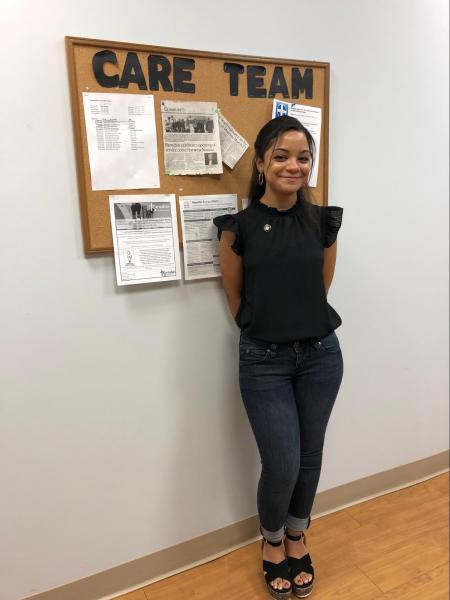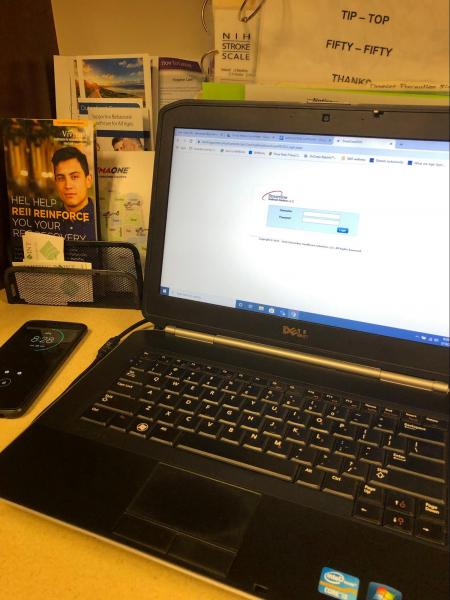Self-Care Isn’t Selfish Care
“So, how is it?” Friends and family always ask me this question, and for the longest time, I didn’t know how to answer. The truth is that I love my host site and the population that I serve. I serve as a National Health Corps  AmeriCorps member at Starting Point Behavioral Health and in Baptist Nassau Emergency Department (ED). My host site treats individuals experiencing mental health and substance use disorders. I love the field of behavioral health more than I thought that I would. However, it’s not easy. As an empathic person, it has always been difficult for me not to absorb the emotions and the troubles of those around me. Luckily, in a previous position, I had learned about vicarious trauma. Vicarious trauma is the second-hand trauma that occurs from helping clients who have experienced trauma, which often happens to those in care-giving positions. I had also learned about the burnout that could happen as a result of being in a care-giving profession or position. Therefore, I was mindful to watch out for the signs of burnout in myself when I began serving: emotional distancing, fatigue, isolation, frequent sadness, insomnia, irritability and losing interest in things that I used to enjoy. In the ED, I knew that I might see difficult cases such as individuals experiencing homelessness, dying people being brought in by rescue, people being woken up from overdoses, and people so hopeless that they want to die. As mindful as I tried to be, and as much as my supervisors reminded me to slow down and take care of myself; I still neglected my self-care activities that helped me recharge my social battery and tended to my mental health.
AmeriCorps member at Starting Point Behavioral Health and in Baptist Nassau Emergency Department (ED). My host site treats individuals experiencing mental health and substance use disorders. I love the field of behavioral health more than I thought that I would. However, it’s not easy. As an empathic person, it has always been difficult for me not to absorb the emotions and the troubles of those around me. Luckily, in a previous position, I had learned about vicarious trauma. Vicarious trauma is the second-hand trauma that occurs from helping clients who have experienced trauma, which often happens to those in care-giving positions. I had also learned about the burnout that could happen as a result of being in a care-giving profession or position. Therefore, I was mindful to watch out for the signs of burnout in myself when I began serving: emotional distancing, fatigue, isolation, frequent sadness, insomnia, irritability and losing interest in things that I used to enjoy. In the ED, I knew that I might see difficult cases such as individuals experiencing homelessness, dying people being brought in by rescue, people being woken up from overdoses, and people so hopeless that they want to die. As mindful as I tried to be, and as much as my supervisors reminded me to slow down and take care of myself; I still neglected my self-care activities that helped me recharge my social battery and tended to my mental health.
For the first four months of service, I was a machine. I racked up lots of hours serving ten-hour days and every other weekend in the ED. I refused to acknowledge that I was tired or that I was sad after a long day of listening to misfortunes and only being able to do a little bit to help because I thought “my struggles don’t compare.” Loved ones began voicing their concerns about how much I was serving. I brushed it off thinking, “They just don’t understand how much help is needed. Someone has to be there for them!” And then it happened. My success story. Jason* had checked himself into the ED because he was experiencing suicidal ideations. He was also extremely intoxicated. I went into the room to attempt to speak with him. Jason wanted nothing to do with Starting Point nor did he accept the fact that he might need outpatient treatment because he had sought treatment before which had not helped him. Jason was skeptical when I told him that I was there for him and that I wasn’t going to give up on him. He was used to empty promises and falling through the cracks of the system.
After two months of pestering and encouragement, Jason finally came into Starting Point. He was connected to a psychiatrist and a therapist; both of whom he liked. He was working again and learning to cope with his past traumas in a healthy way. But, Jason started feeling so much better that he decided he didn’t need to come in for therapy anymore because he thought that medication alone would be enough to stabilize him. I started spending energy trying to get him re-engaged because he had stopped answering my calls. I was thinking about his case while I was home, and I was constantly worrying about him. Meanwhile, there were increasingly intense cases coming to the ED: elderly clients with suicidal ideations and young clients suffering from substance use. In addition to that, one of my clients passed away. I had only been working with her for about a month, and she had had severe health issues which resulted in her passing… but her death was very unsettling to me. I was scared that Jason would end up the same way, and I did exactly what you are not supposed to do in the care-giving field: I blamed myself. I thought that I wasn’t doing enough to help him help himself.
 Finally, I had fellow care-givers point out the signs of burnout in me. Despite realizing that I was feeling the effects of burnout, I continued to push forward and refused to take a personal day. Because of this, my physical health also declined, and since I didn’t take a sick day, the sick day took me. Ever since, I have been careful to incorporate self-care activities into my day: listening to music in the mornings, taking lunch by myself, painting, watching happy/positive things instead of my usual crime shows and horror movies, and declining invitations on the weekends to recharge my social battery. The beauty of working with a bunch of therapists and clinicians is threefold: 1) they have all been there and had the exact same worries, 2) they are trained to help you work through your thoughts, and 3) they are a supportive network to remind you that you are doing everything you can but the rest is up to the client. Thankfully, Jason and I finally had a conversation. I helped him schedule an appointment and coordinated transportation to it. It is now 8 months into my service, and of course I still have hard days, but that’s what self-care and friendships are for. So, I would like to remind my fellow NHC AmeriCorps members in Florida and the other operating sites: you are doing amazing work, but you are human! Just because you can handle it yourself, doesn’t mean that you need to shoulder the burden alone.
Finally, I had fellow care-givers point out the signs of burnout in me. Despite realizing that I was feeling the effects of burnout, I continued to push forward and refused to take a personal day. Because of this, my physical health also declined, and since I didn’t take a sick day, the sick day took me. Ever since, I have been careful to incorporate self-care activities into my day: listening to music in the mornings, taking lunch by myself, painting, watching happy/positive things instead of my usual crime shows and horror movies, and declining invitations on the weekends to recharge my social battery. The beauty of working with a bunch of therapists and clinicians is threefold: 1) they have all been there and had the exact same worries, 2) they are trained to help you work through your thoughts, and 3) they are a supportive network to remind you that you are doing everything you can but the rest is up to the client. Thankfully, Jason and I finally had a conversation. I helped him schedule an appointment and coordinated transportation to it. It is now 8 months into my service, and of course I still have hard days, but that’s what self-care and friendships are for. So, I would like to remind my fellow NHC AmeriCorps members in Florida and the other operating sites: you are doing amazing work, but you are human! Just because you can handle it yourself, doesn’t mean that you need to shoulder the burden alone.
*Name changed to protect client’s privacy

This blog was authored by NHC Florida member Daphney Torres
Daphney serves at Starting Point Behavioral Health as a Care Coordinator.